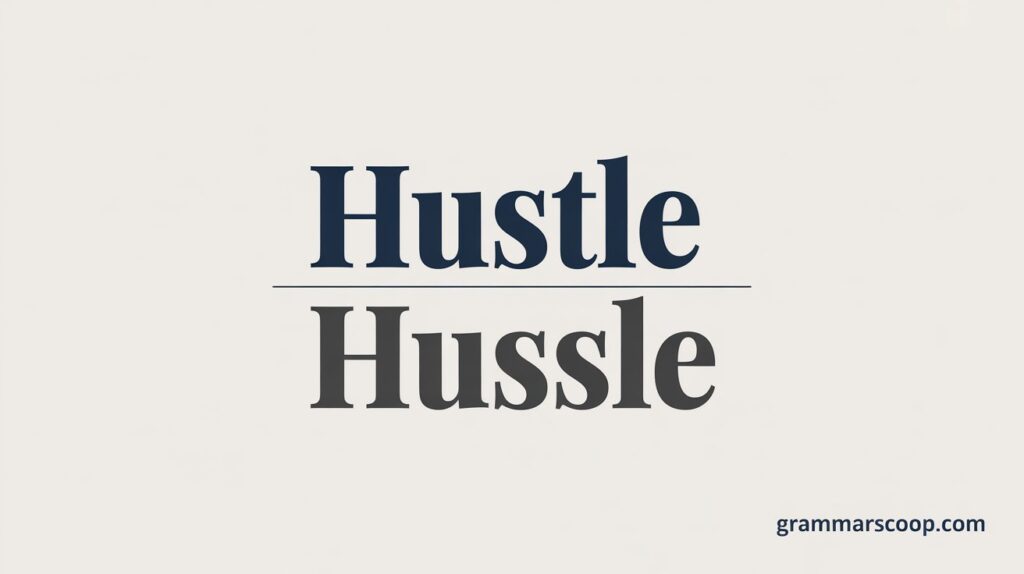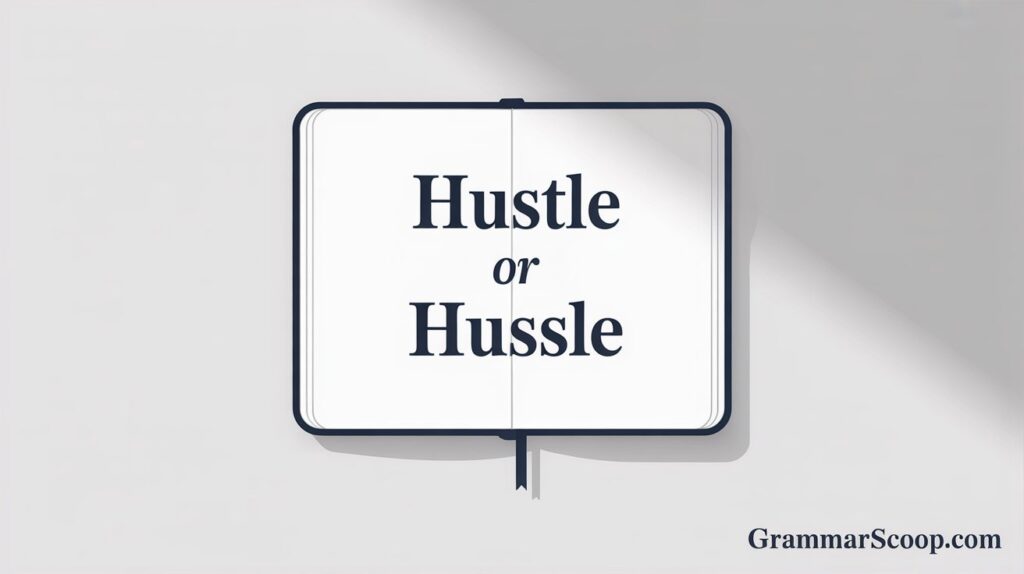When it comes to the correct spelling, many people ask: Is it hustle or hussle? The two look similar, sound almost identical, and sometimes even get used interchangeably online. But make no mistake—only one of them belongs in formal writing, dictionaries, and professional communication.
In this post, you’ll learn the correct spelling, the meanings behind both versions, why people mix them up, and when (if ever) you should use hussle. We’ll also break down pronunciation, synonyms, real-world examples, and what the word “hustle” actually means in modern business, slang, and pop culture.
Quick Summary — Hustle Or Hussle
The debate between hustle or hussle comes down to simple grammar: hustle is the only correct spelling in standard English. It means to work hard, move quickly, or act with energy and determination. In contrast, hussle isn’t a real word—it’s mostly seen as a proper name, like in Nipsey Hussle, or used in branding. While the two sound identical, only hustle appears in dictionaries and carries legitimate definitions across business, sports, and slang. If you’re writing professionally or casually, always use hustle—unless you’re specifically referencing a name or brand.
Let’s not bury the lede.
| Spelling | Is It Correct? | Meaning | Usage |
|---|---|---|---|
| Hustle | Yes | To work hard, move fast, or push | Standard English word |
| Hussle | No | Not an actual word in English | Used only as a name or brand |
Correct spelling: hustle
The spelling hussle is not recognized in standard English dictionaries. It’s mostly a stylistic variation or a proper name, made popular by people like Nipsey Hussle, the late rapper and entrepreneur.
Why People Confuse Hustle Vs Hussle

So why does this mix-up even exist? There are a few real reasons:
- Phonetic confusion: Both sound the same when spoken.
- Pop culture influence: Nipsey Hussle’s global fame introduced millions to the alternate spelling.
- Autocorrect errors: Sometimes phones or text tools auto-correct “hustle” incorrectly.
- Brand stylization: Some businesses use Hussle to stand out, creating even more confusion.
Here’s an example:
“You gotta respect the hussle.” ← looks cool on a shirt, but technically incorrect spelling.
What Does Hustle Actually Mean?
Hustle Definition in Standard English
Hustle is a real, widely accepted word in the English language. It’s packed with energy, urgency, and action. Depending on context, it has several meanings:
- To work hard with determination
Example: She hustled for years before her startup took off. - To move fast or with urgency
Example: The player hustled down the court for a fast break. - To push aggressively, sometimes deceitfully
Example: He hustled tourists out of their money.
Hustle in Modern Culture
In today’s world, hustle has evolved into a badge of honor. It symbolizes ambition, productivity, and never giving up.
“I’m on my hustle” = I’m working hard, grinding, staying focused.
Side hustle, hustle culture, and hustle mindset are now everyday terms in entrepreneurship, self-help, and business communities.
Is Hussle Even a Word?
Here’s the truth:
- Hussle is not an English word.
- It’s not in any major dictionaries like Oxford, Merriam-Webster, or Cambridge.
- Most usage stems from names, branding, or artistic expression.
Famous Example: Nipsey Hussle
Nipsey Hussle, born Ermias Joseph Asghedom, used this unique spelling as a stage name, inspired by comedian Nipsey Russell. His influence helped normalize the spelling Hussle, especially in hip-hop culture.
Brands Using Hussle
Some companies have jumped on the trend:
- Hussle (UK-based fitness platform)
- Hussle Co. (apparel and branding)
But these are exceptions, not rules. In formal English, hustle is always the correct spelling.
Hustle Or Hussle — Key Differences

| Feature | Hustle | Hussle |
|---|---|---|
| Part of Speech | Verb, Noun | Proper Noun (Name only) |
| Dictionary Definition | Yes | No |
| Meaning | Effort, movement, business grind | No standard meaning |
| Usage Context | Everyday, business, sports, slang | Mainly pop culture or branding |
| Accepted in Grammar? | Yes | No |
Origins and Evolution of Hustle
The word hustle may sound modern, but its roots run deep into European history. Understanding where it came from helps explain how it took on such layered meaning in today’s language—from shady street deals to startup culture glory.
Dutch Beginnings: Husselen
The word hustle traces back to the Dutch verb “husselen”, which means “to shake,” “to toss,” or “to move back and forth.”
- Dutch merchants in the 17th century used husselen to describe quick or forceful movement, especially in the bustling markets of Amsterdam.
- The root connotation? Energy. Activity. Agitation.
This Dutch term eventually made its way into other languages, including English, during periods of trade, migration, and colonial expansion.
Adoption into American English
By the 1800s, “hustle” entered American slang, but not with the motivational tone we hear today.
- Early American use often described pushing, shoving, or hurrying in a physical sense.
Example: “He hustled through the crowd.” - By the late 19th century, it developed a darker side:
“Hustling” meant conning, cheating, or pulling a fast one.
Example: “He hustled tourists out of their cash.”
Interesting Fact: The word “hustler” became a label for someone slick, persuasive, and street-smart, especially someone who made money through unconventional or illegal means.
From Scam to Success: A Linguistic Pivot
Language evolves with culture—and “hustle” got a major makeover in the 20th century.
- In the 1960s–70s, urban communities began reclaiming the term to describe grit and ambition, not just deception.
- By the 2000s, in hip-hop, entrepreneurship, and startup culture, “hustling” meant working harder than the rest.
- Jay-Z rapped about his hustle.
- Gary Vaynerchuk preached hustle in business.
- #HustleHard exploded on social media.
Today, when someone says “respect the hustle,” they’re not praising dishonesty—they’re celebrating effort, drive, and relentless ambition.
How Hustle Took Over Modern Culture
Here’s how the word transitioned across decades:
| Era | Common Meaning | Cultural Context |
|---|---|---|
| 1600s (Dutch) | To shake or toss | Rooted in commerce, trade, physical motion |
| 1800s (US) | To rush or shove | Physical movement, urgency |
| 1900s | To deceive or con | Slang for swindling or tricking |
| 2000s+ | To work hard, grind, persist | Business, sports, hip-hop, self-development |
From shady streets to Silicon Valley, hustle has transformed into a global mantra for ambition and effort.
Modern Use Still Honors Its Past
Although its meaning has shifted over time, the definition of hustle still holds onto its core essence—urgency and movement, just like its Dutch ancestor. Whether you’re chasing a goal or managing multiple side hustles, the underlying message stays the same: keep moving, stay active, and push forward.
This rich history makes “hustle” one of the most powerful, versatile, and culturally charged words in the English language today.
Let me know if you’d like visuals like:
- A timeline of hustle’s evolution
- A quote carousel with famous hustle-related quotes
- A pronunciation audio guide (IPA: /ˈhʌsəl/)
Want me to build out another section next?
Synonyms for Hustle
Depending on the context, hustle synonyms change slightly:
In the context of hard work:
- Grind
- Push
- Strive
- Work hard
- Go-getter attitude
- Persevere
- Execute
- Ambition
In fast movement:
- Rush
- Dart
- Dash
- Scamper
- Sprint
- Bolt
And scamming:
- Con
- Swindle
- Cheat
- Deceive
- Trick
Explore further:
- Sense Vs Since: A Clear Guide to Choosing the Right Word
- Than vs Then: Fixing Everyday English Errors
- Igniter or Ignitor: How to pick the right spelling?
- Excell or Excel: What is the Correct Spelling?
- Busses Or Buses: What’s the Proper Plural of Bus?
Example Sentences Using Hustle
To see hustle in action, here are some sample sentences from different contexts:
- “If you want success, you need to hustle every day.”
- “The kids were told to hustle back to class.”
- “She’s got a serious hustle mindset—never stops grinding.”
- “He tried to hustle them with a fake investment pitch.”
- “I started a side hustle selling handmade soaps.”
Tip: Never use hussle in any of these sentences unless it’s part of a brand or name.
Common Misspellings and Mistaken Phrases
Here’s where people trip up:
| Phrase | Is It Correct? | Notes |
|---|---|---|
| Respect the hustle | Yes | Most common correct version |
| Respect the hussle | No | Only correct if referencing Nipsey |
| Work hustle | Yes | Means effort or intensity at work |
| Work hussle | No | Misspelling |
| Side hustle | Yes | Extra income or passion project |
| Side hussle | No | Incorrect spelling |
When It’s Okay to Use Hussle
There are limited, specific cases where the spelling Hussle is acceptable:
- Proper names (e.g., Nipsey Hussle)
- Branding (companies or services that use the alternate spelling)
- Artistic license (lyrics, poetry, or stylized visuals)
Just don’t use it in formal writing, job applications, or professional content unless you’re referencing a specific person or product.
Pronunciation of Hustle Vs Hussle
Pronounced exactly the same way:
- /ˈhʌsəl/
- Rhymes with muscle or tussle
That’s why the spelling confusion exists—it sounds right either way.
FAQs — Hustle or Hussle
- What is the correct spelling — hustle or hussle?
The correct spelling is hustle. “Hussle” is not found in any standard English dictionaries.
- Is hussle a real word?
No, it’s a stylistic spelling, usually used as a name.
- Is it “respect the hustle” or “respect the hussle”?
Unless you’re referring to Nipsey Hussle, the correct phrase is “respect the hustle.”
- Why do people spell hustle as hussle?
Mostly due to pop culture influence, autocorrect mistakes, or branding.
- Is hustle the same as hassle?
Not at all. Hustle means effort or speed. Hassle means inconvenience or trouble.
- How do I remember the spelling of hustle?
Think of the “t” in hustle as standing for “try”—always pushing, always trying.
Final Thoughts: Hustle, Not Hussle
In the debate of hustle or hussle, there’s a clear winner. Hustle is the correct spelling, the standard, the one you’ll find in dictionaries, resumes, and business conversations.
Hussle, while meaningful in cultural or artistic contexts, simply isn’t a recognized word in the English language. Unless you’re naming a brand or referencing Nipsey Hussle, stick with hustle—the version backed by centuries of usage, rich meaning, and linguistic credibility.
“Success usually comes to those who are too busy to be looking for it.”
— Henry David Thoreau
That’s the hustle mindset. Just make sure you spell it right.

Lisa Morris is a seasoned blogger and language enthusiast with a passion for making grammar simple and engaging. At Grammar Scoop, she shares clear, concise tips that help readers master the rules of English with confidence.






